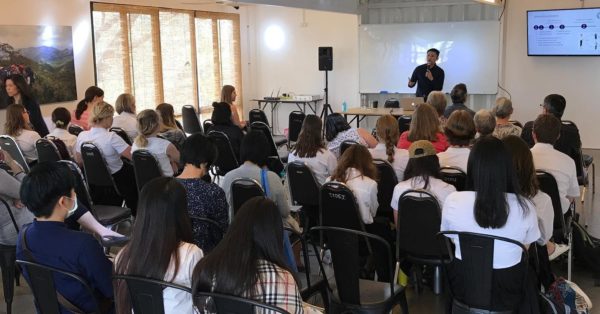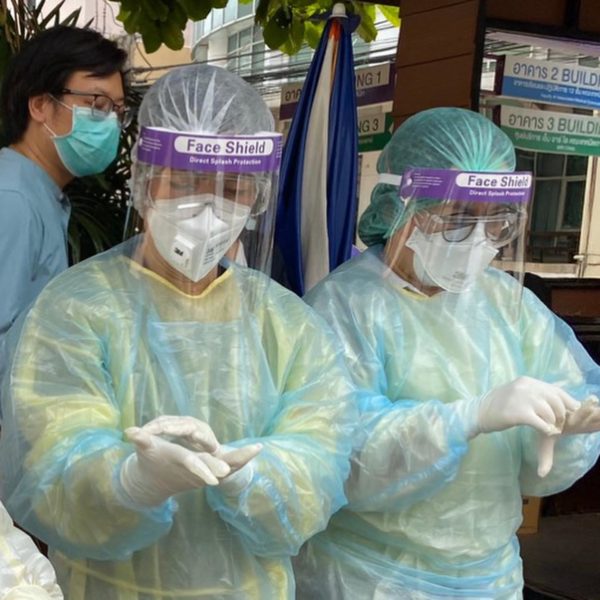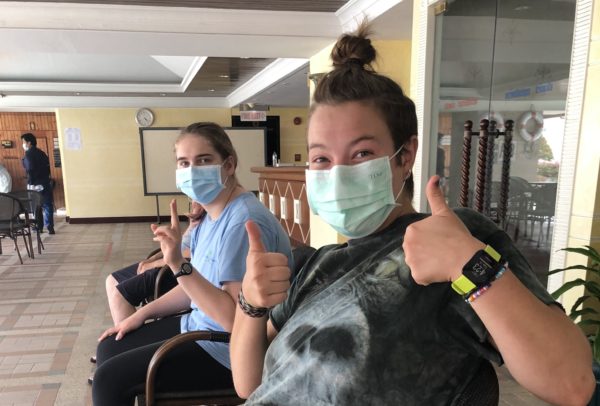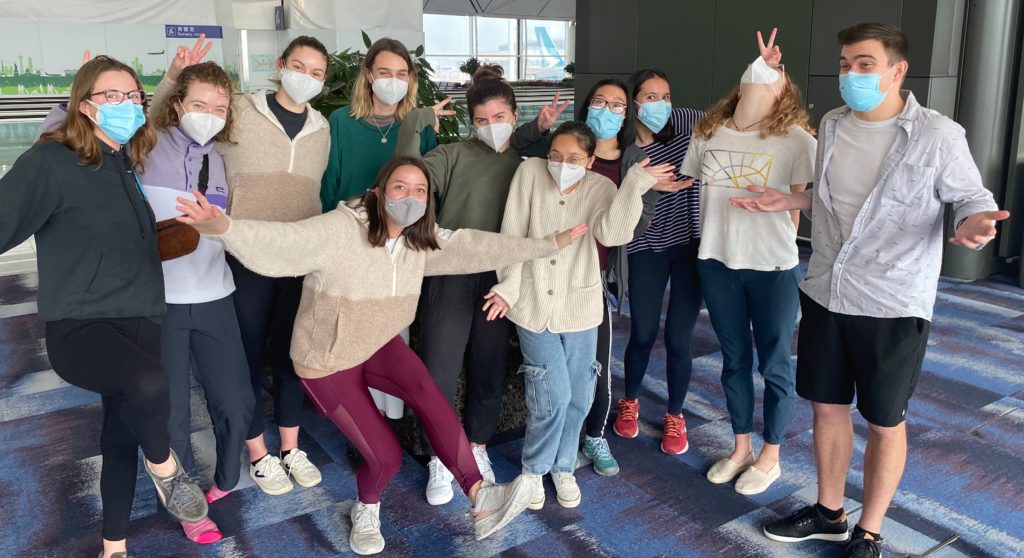Study Abroad in a Pandemic: Lessons Learned
In spite of the global COVID-19 pandemic, ISDSI was able to continue to operate both Fall 2020 and Spring 2021 semesters, as well as launch a new program.
We relied on 20+ years of relationships in Thailand, deep connections to local public health and provincial epidemiology experts, and a long history of proactive risk management.
The study abroad field has been forced to embrace ongoing uncertainty since COVID-19 was declared a global pandemic. Like most study abroad organizations, ISDSI quickly pivoted mid-March 2020 to help our students return to the United States and complete the rest of their semester coursework online as our university partners withdrew students because of university travel restrictions.

ISDSI hosted a community seminar with Chiang Mai Public Health epidemiologists early on to keep our students and community stakeholders aware of what was happening with COVID-19.
During this time we explored virtual programming, online training courses, and other educational platforms to continue to provide a unique educational experience. We also continued to monitor the situation in Thailand through our partnership with NGOs, public health officials, medical doctors (both Thai and American), and local and international epidemiology experts. Two of our staff with public health and medical backgrounds shifted to work in public health doing COVID-19 testing, and through them and others we had a direct view of what was happening with COVID in Thailand.

Two ISDSI staff members getting trained in COVID-19 sample collection and RT-PCR testing.
Deciding to Run Fall 2020
We were able to reinstate our Fall 2020 study abroad program due to a combination of “green lights” from the Thai government, some long-standing university partners, and a cohort of resilient students.
Thailand was able to get a handle on the COIVD outbreak very quickly, and eventually reached zero locally transmitted cases. They had halted all flights, and were carefully reopening with a mandatory 15 day quarantine and mandatory testing of everyone coming into the country.
By the late summer, Thailand had gone without any cases for months, and we were approached by one of our university partners, as well as some interested students, to see if a Fall 2020 semester was possible. Thailand also began to issue education visas for students.
After assessing the risk through talking with our US based partners, Thai public health experts, and others, we decided to go ahead and run our Fall 2020 semester. After about 6-10 weeks of working with the new cohort of 8 students, and exploring if this was even possible, the group landed in Bangkok for their 15 day quarantine before flying up to Chiang Mai.
The Travel Process
Since there were no commercial flights into Thailand, the biggest challenge was coordinating an entirely new set of travel requirements that was constantly changing.
- In addition to the visa, travelers needed a Certificate of Entry (COE) stating their flight and travel plans.
- All travelers had to pre-book a repatriation flight and an Alternative State Quarantine (ASQ) hotel before the Certificate of Entry would be approved.
- All travelers needed to get a negative result on an RT-PCR COVID-19 test as well as a Fit-to-Fly Certificate 72 hours prior to departure.
- All travelers needed health insurance that specifically covered $100,000 USD for COVID-19 treatment in Thailand.
We worked closely with the Thai Consulates in the US (some of which had different regulations), as well as online resources of stranded expats who were sharing information as it became available. We talked directly with friends who had successfully returned to Thailand, and had to do a lot of fact-checking, since there was a lot of incorrect information online.
Key to this process was having two of our ISDSI staff in the US who could coordinate with our ISDSI staff in Chiang Mai — comparing notes, booking hotels and flights, talking with people in Consulates and government offices, etc. At the same time, we continued to monitor the COVID-19 situation in Thailand, preparing contingency plans if there was a second wave.
Prior to COVID-19, our students would navigate the travel and visa process independently. It quickly became clear that wouldn’t be possible.
- Coordinating the flight and ASQ hotel were critical — flights would only become available at the end of the month, and had to be booked immediately before they would fill due to a very limited number of seats.
- Students were coming from several states (as well as Japan), and COVID-19 testing was NOT easily available in the US, and without a test within 72 hours of departure, travelers would be refused boarding.
To secure the COE required building a very good relationship with one airline, as well as one ASQ hotel over many phone calls and emails before we knew we would be able to fly the students in and quarantine them.
We also realized that we needed to find a place where A) the students could all get tested; and B) we would be able to gather pre-departure and make sure all of the paperwork was in order.
While the Thai team was working on the flights and ASQ, the US team was working on both visas and COEs, as well as searching for a place where we could get RT-PCR testing. We eventually decided to fly the entire group to Los Angeles, and stay at a hotel next to LAX since we found access to clinics (and back up clinics) that could do a same day RT-PCR test, as well as fit-to-fly, AND it was a departure point for the airline we selected.
Our timeline for the first cohort and subsequent cohorts was:
- Two weeks before departure: Isolate at home as much as possible.
- Pre-domestic flight: COVID-19 test
- 3 days before departure: Our US team flew into LA and confirmed clinics and tests.
- 2 days before departure: Students arrived in LA.
- 1 day before departure: COVID test and Fit-to-Fly exam.
- Day of departure: Re-pack and test results, and to the airport late that night for a departure just after midnight.
32 hours later the students arrived in Bangkok, accompanied by one of our American ISDSI staff members who was returning to Thailand, and began quarantine.

Students waiting for their COVID-19 test during quarantine in Bangkok.
During quarantine we used the time to teach Thai language, start their course on Thai history and society, and begin to orient the students to life in Thailand under COVID-19.
Key to the process was having one of our American staff along to help coordinate the process, trouble shoot when there were mistakes in paperwork or visa applications or COE documents, and perhaps most importantly care for the students during a very stressful and unique international travel experience.
We were able to repeat the process for our Spring 2021 cohort, with the support of one of our US staff helping coordinate things again. The process of visas and COEs had changed, but we had enough lead time to figure it out. Our first Spring cohort left from LA. However, when our third and final cohort was due to leave, we switched to a Seattle departure due to increased COVID rates in LA, but followed the same procedures of testing. At the same time there was an on-going second wave of COVID-19 in Thailand that was localized mostly to the area around Bangkok, and we had to keep abreast of that while deciding if it was safe for students to come on the program.
Our Spring 2021 group consisted of 16 students in two cohorts, one group enrolled in our regular program, and one coming to launch a new program we had developed with a university partner during the last year.

Students on their way to Thailand — Certificates of Entry, negative COVID-19 tests, and Fit-to-Fly certificates issued.
We are currently working with a group of students for placements in internships and service-learning for summer 2021.
Lessons Learned
Like for everyone, the whole year of 2020-21 has been a very steep learning curve, which required navigating a lot of uncertainty. We dug deep into assessing risks (real, imagined, and relative), and worked with trusted people and organizations to keep operating.
Not everything we learned can be replicated in other countries or by other program providers, but we think that there are some universal lessons that would be helpful to both study abroad providers as well as sending institutions. We could not have done this without the trust of students, parents, university partners, and local communities of experts in Thailand.
Trusted partnerships
Our ability to facilitate study abroad programs during the COVID-19 pandemic would have never worked without trusted university partnerships. Though some university partners were unable to participate due to institutional travel restrictions to allow students to study abroad with us, those that were able bent over backwards to make this an option for their students. They trusted us, and we maintained steady two-way communication throughout the process.
Backup Plans
We held all things loosely, and built in backup plans to mitigate risk. We had to allow the entire process to be deconstructed and reconstructed with the global pandemic in mind. Now, more than ever, we had to expect things to fall through. We had backup COVID-19 testing and Fit to Fly sites in case a last-minute issue came up with our original booking. We considered what would happen if students tested positive in the departure city and strongly encouraged students to isolate before departure and do a COVID-19 test in their local community before traveling to meet the group. If a student tested positive prior to traveling to the departure city, the student could remain with family and avoid being stuck away from home without a way to get back. We also strongly recommended that students purchase trip insurance with coverage if they were to test positive for COVID-19 prior to travel.
Out of 25 total students we had one test positive for COVID-19 before departure in the US. Since they would be unable to fly, we were able to arrange housing for them while they waited the CDC required period before they were able to return home and continue studies with their home institution.
Communication
In communicating with students, we worked to strike a balance between being realistic about the risks without overwhelming them about the enormity of the process. We broke down the visa and travel process into phases and addressed the complexities of each phase one at a time. By doing this, the enormity of the risk and room for error were shouldered by ISDSI and not passed onto the students.
Stay on top of the local situation
A real key to being able to operate for both Fall and Spring for the 2020-21 academic year was deep connections to local public health officials, experience of ISDSI staff in working with other public health issues (e.g. HIV/AIDS in the late 90s), and good relationships with NGOs and others trying to figure out what was possible.
Filter and assess what is really going on
Figuring out what was really happening was difficult. There were some great leads on social media groups about what was possible, but there were as many (or more) false stories, misinformation, or rumors as there was truth. We always went back to the source, be it airline, ASQ hotel, Thai Consulate, or other sources of information.
Care for the students
This has been a tremendously challenging year for college and university students. A lot of them are just stressed out and traumatized by COVID-19, cancellation of classes, knowing people who’ve tested positive or died from COVID-19, and more. It is a HUGE process to even consider traveling during the pandemic. A lot of what we did was to talk with them (and parents) about what the risks are, what we’ve done to mitigate risks, and what they can do.
Having a staff person travel with them or meeting them to coordinate departure was critical. The paperwork for entry into Thailand is complicated. Our staff member was able to catch typos in names, mistakes in passport numbers, etc., and correct them before they checked into the flight.
On-going checking in with the students once they have arrived is also important, as while everyone wears masks in Thailand, life is pretty much back to normal. That can be pretty disorienting to students who are exhausted from being on high alert for the last year.
Challenges
There were obviously a huge number of challenges to overcome to continue to operate both Fall and Spring for the 2020-21 academic year.
The pandemic
Obviously the pandemic itself is the biggest challenge, and we are fortunate to operate in Thailand where aggressive track-trace-isolate policies kept COVID under control in both the first and second wave. That said, without a lot of experience assessing and managing risk, as well as deep connections to public health and epidemiology, we would not have bene able to continue to operate.
Blanket Travel Bans
Even thought there was no or limited COVID-19 transmission in Thailand, some students were unable to come due to their university putting into place a global travel ban to all countries. We worked directly with some partners to help their risk management committees understand the risks, and help them make a more nuanced decision than just banning all international travel. Some universities wanted to send students, but could not due to insurance issues, fear of legal liability, or loss of income. We helped students unable to come defer to later semesters when they would be approved.
“Fake” Flights that weren’t operating
A lot of flights that were not actually operating were listed online. It was really challenging dealing with fake (or hopeful) flight postings, especially as students and others started to figure out if they could come. It was, again, important to go back to the source (the Thai government) and find out what flights were allowed to operate, figure out how to book them, and be in close contact with the relevant airlines.
Transit requirements
Another challenge was that it was not just the COVID testing requirements of Thailand that we had to be aware of, but also potential transit countries. With flights changing almost daily, and transit countries changing entry and transit requirements, it was critical to make sure that we were up to date on what was required on the day the students flew. We were fortunate that with Thailand strict requirements, the students also qualified for transit in the countries they had to travel through.
Everywhere is not like the United States
While this should be obvious (and is the whole point of cross-cultural education) we often ran into assumptions and questions about what we were doing that were based on the situation in the US. It is really important for sending institutions to understand that local conditions (like in Thailand) may be radically different than in the US, and so procedures and policies that might be necessary in the US might not be necessary in another context. We are not, for example, testing our students for COVID every week like some US institutions — the Thai government has decided that is unnecessary given the low (or nonexistent) prevalence, and testing uses limited resources they need to conserve.
Conclusion
With vaccinations rolling out in the US (and in Thailand as well), increased treatment options, and on-going public health measures, there does seem to be reason for optimism that the pandemic will recede. However, study abroad will probably never really “return to normal” — travel restrictions, vaccination passports, masking in public places — are all likely to be with us for years to come.
We’ve learned a huge amount during this experience, and are rolling what we’ve learned into preparing for the next pandemic or other unexpected event that could impact our programs. We’re working on diversifying where our students come from, changing to a more flexible staffing and organizational structure, and reviewing other places where we might improve.
Fortunately for us, our local communities remain strong and resilient, and are re-opening to welcome our students to learn about culture, ecology, and sustainability.
—
We would love to hear from you if you’re a sending institution or a study abroad provider. Were you able to operate during the pandemic? What impact did it have? And as always, if you have further questions about what we did (we skipped a LOT of details), please feel free to get in touch with us at [email protected].